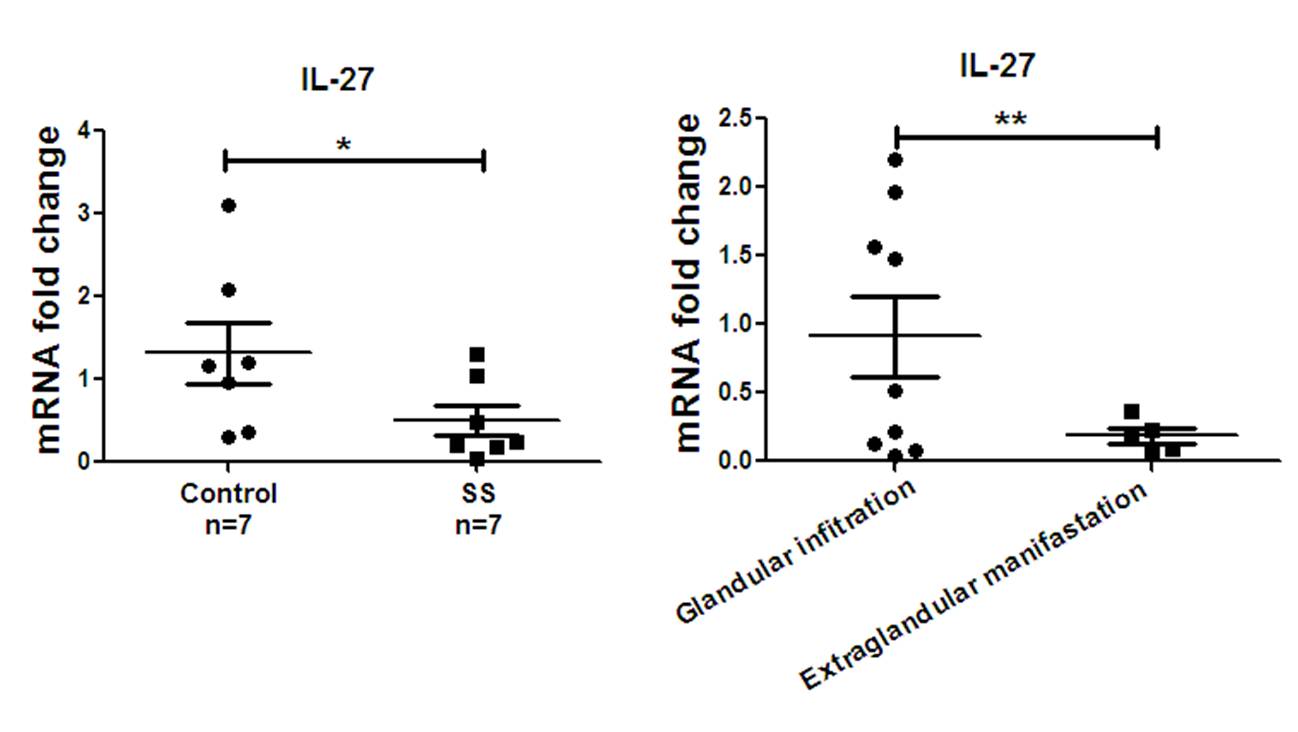Session Information
Date: Monday, November 9, 2015
Title: Cytokines, Mediators, Cell-cell Adhesion, Cell Trafficking and Angiogenesis II
Session Type: ACR Concurrent Abstract Session
Session Time: 2:30PM-4:00PM
Background/Purpose:
Sjögren’s
Syndrome (SS) is a systemic autoimmune disease characterized by chronic
inflammation involving the exocrine glands, particularly the salivary and
lacrimal glands. The pathogenesis of SS is complicated with many respects
remaining elusive. IL-27, a member of IL-12 cytokine family, has the pro- and
anti-inflammatory properties during immune responses. IL-27 can induce the differentiation
of type 1 regulatory T (Tr1) cells from human naive CD4+ T cells. Recent
studies have shown that IL-27 was involved in anti-inflammatory functions in SS.
However, the underlying mechanism of IL-27 in SS is still unknown. In the
present study, Tr1 cells were studied in IL-27 knock-out and wild-type SS
models and patients for the purpose to explore the specific mechanism of IL-27
in SS.
Methods: IL-27
mRNA expression in PBMC of SS patients was detected by real-time PCR. Serum
IL-10 of SS patients and model animals was determined by ELISA. Infiltrated
IL-10+ cells in labial gland of SS patients were assessed by
immunohistochemistry. Tr1 cells in human peripheral blood and mice spleen were
measured by flow cytometry.
Results: IL-27
mRNA expression was decreased in SS patients. The level of IL-27 mRNA in
patients with glandular infiltration was higher than those with extraglandular
manifestation (Fig 1).
Figure
1
In
SS patients, infiltrated IL-10+ cells in labial gland were significantly
decreased (Fig 2 A and B). Serum IL-10 was significantly
decreased in SS patients than healthy controls (Fig
2C). Compared with control, the frequency of Tr1 cells in peripheral
blood of SS patients significantly reduced (Fig 2D).
Figure 2
IL-27
deficient NOD (Non-Obese Diabetic) mice displayed more severe SS-like
autoimmune disorders than NOD mice. The saliva flow rate was decreased and the submandibular
gland weight/body weight index increased (Fig 3A and B). The percentage of CD4+IL-10+ Tr1
cells in splenocytes was significantly lower than NOD mice (Fig 3C). The serum IL-10 also decreased significantly
(Fig 3D).
Figure 3
Conclusion: In general, these
findings indicated that IL-27 deficiency deteriorated the disease symptoms of
SS through loss of inducing Tr1 cells differentiation. Our data suggested that IL-27
and IL-27-induced Tr1 cells played an important role in the pathogenesis of SS.
To cite this abstract in AMA style:
Yao G, Shi B, Qi J, Wang Y, Chen W, Tang X, Wang D, Feng X, Sun L. Deficiency of IL-27 Exacerbate Sjögren’s Syndrome through Inhibiting Differentiation of Type 1 Regulatory T Cells [abstract]. Arthritis Rheumatol. 2015; 67 (suppl 10). https://acrabstracts.org/abstract/deficiency-of-il-27-exacerbate-sjogrens-syndrome-through-inhibiting-differentiation-of-type-1-regulatory-t-cells/. Accessed .« Back to 2015 ACR/ARHP Annual Meeting
ACR Meeting Abstracts - https://acrabstracts.org/abstract/deficiency-of-il-27-exacerbate-sjogrens-syndrome-through-inhibiting-differentiation-of-type-1-regulatory-t-cells/



